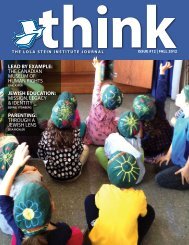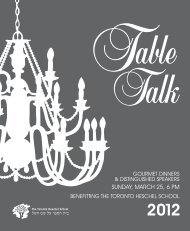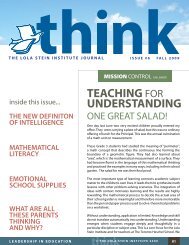Issue No. 13 - The Toronto Heschel School
Issue No. 13 - The Toronto Heschel School
Issue No. 13 - The Toronto Heschel School
You also want an ePaper? Increase the reach of your titles
YUMPU automatically turns print PDFs into web optimized ePapers that Google loves.
SPOT LIGHT ON THE LOLA STEIN<br />
<strong>The</strong> L.A. Pincus Fund for<br />
Jewish Education in the<br />
Diaspora is an Israel-based<br />
foundation committed to<br />
educational excellence<br />
in Jewish communities<br />
around the world. Since<br />
1977, the Pincus Fund<br />
has supported more<br />
than 800 projects in over<br />
50 countries, ranging<br />
from the establishment<br />
and expansion of Jewish<br />
day schools to teacher<br />
training and adult<br />
education.<br />
“<strong>The</strong> greatest thing I<br />
always say about the<br />
Pincus Fund is how far a<br />
little money can go,” says<br />
Julie Koschitzky, a leader<br />
in Jewish organizations in Canada and internationally, and former<br />
chair of the Pincus Fund. “If you go to communities anywhere in the<br />
world and you say Pincus Fund,” continues Ms. Koschitzky, “it’s held<br />
in the highest esteem, because sometimes it saves an educational<br />
component, and it does so much with very little.”<br />
In 2012, the Pincus Fund recognized <strong>The</strong> Lola Stein Institute’s<br />
outstanding curriculum in integrated Jewish studies and its<br />
capacity for teacher training. Pincus awarded Lola Stein a grant to<br />
pilot a collaborative process that will enable Jewish day schools<br />
to adapt and implement Lola Stein methods and curriculum for<br />
their own schools. Throughout the 2012–20<strong>13</strong> school year, Lola<br />
Stein Institute staff, along with several teachers from <strong>The</strong> <strong>Toronto</strong><br />
<strong>Heschel</strong> <strong>School</strong>, where the methods and curriculum have been used<br />
effectively, joined forces on the Pincus project with colleagues from<br />
Robbins Hebrew Academy (<strong>Toronto</strong>) and Kehila Jewish Community<br />
Day <strong>School</strong> (Hamilton).<br />
<strong>The</strong> first phase of the project saw the Lola Stein and <strong>Toronto</strong> <strong>Heschel</strong><br />
cohort introduce the philosophy and methodology of integrated<br />
curriculum to their project partners, along with explanatory course<br />
materials to ease collaboration. Both Robbins Hebrew Academy<br />
and Kehila Jewish Community Day <strong>School</strong> chose to adapt for their<br />
own use discreet segments of a larger school-wide interdisciplinary<br />
project called the Living Haggadah. <strong>The</strong> adapted curriculum was<br />
then taught in their respective classrooms in preparation for<br />
Passover.<br />
<strong>The</strong> Living Haggadah is a collection of Passover programs that<br />
encompasses several academic disciplines and allows students in a<br />
range of grades to interpret the Passover story through a fresh lens<br />
PINCUS GRANT AWARDED<br />
SUPPORT FOR TEACHER TRAINING<br />
PINCUS IN JERUSALEM RECOGNIZES LOLA STEIN VISION FOR INTEGRATED JEWISH STUDIES<br />
<strong>The</strong> Eco-Seder is beloved in Grade 6 at<br />
<strong>Toronto</strong> <strong>Heschel</strong>. It is one part of the<br />
school-wide Living Hagaddah Program.<br />
every year. Students in Grades 3 and 4 at Kehila Jewish Community<br />
Day <strong>School</strong> worked on a unit called the Halutzim Haggadah,<br />
which connects elements of the Passover Seder to the story of the<br />
nineteenth-century pioneers (the Halutzim) who left their homes<br />
in Eastern Europe for the land of Israel. <strong>The</strong> students looked at the<br />
prayer chanted every year on Passover, “Next year in the land of<br />
Israel,” and learned that the Halutzim were people who decided to<br />
make that prayer a reality.<br />
With parts of the unit appearing as lessons in their English<br />
Language Arts classes, parts in their Social and Environmental<br />
Studies classes, and parts in their study of Hebrew Language, the<br />
Grades 3 and 4 Kehila students gained a deeper appreciation of<br />
important Passover themes, such as the meaning of a journey to a<br />
new land and the pursuit of new goals. <strong>The</strong>y also gained insight into<br />
a fascinating period in the modern history of the Jewish people.<br />
Rachely Tal of the Kehila Jewish Community <strong>School</strong> told think that<br />
“the curriculum is very interesting and very challenging and [that<br />
she has] been enjoying it in spite of the fact that [she is] spending<br />
lots of time on finding and creating support materials such as<br />
songs, videos, photographs, flash cards, games, and lesson plans.”<br />
At Robbins Hebrew Academy, Grade 7 students worked on<br />
a unit of the Living Haggadah called the Eco-Seder. <strong>The</strong> Eco-<br />
Seder is an interdisciplinary project in which the Passover<br />
Seder is examined from an ecological perspective. Each student<br />
completes work through a specifically organized process of<br />
Judaic text interpretation, biological research, data management,<br />
environmental study, and visual arts. Students explore the Seder<br />
for ecological themes, such as the use of water, life and death<br />
in nature, food distribution, and green spaces. <strong>The</strong> integrated<br />
approach encourages analogical and integrative thinking skills<br />
while achieving learning objectives specific to each discipline.<br />
“<strong>The</strong> way [<strong>The</strong> Lola Stein Institute] integrates their Judaic Studies<br />
into the rest of the curriculum,” says Julie Koschitzky, “they do such<br />
interesting things and this grant means that people will know<br />
about it.”<br />
On a visit to Robbins Hebrew Academy, Lola Stein Director Greg Beiles<br />
mentors teachers Shoshana Taitz and Lauren Damelin on the math and science<br />
components of the Eco-Seder.<br />
STUDY WITH HARTMAN IN TORONTO AT THE<br />
SHALOM HARTMAN SENIOR EDUCATORS STUDY FORUM<br />
HOSTED BY THE LOLA STEIN INSTITUTE<br />
World-class faculty — Serious text study with educational leaders from day schools, congregational and supplementary<br />
schools, summer camps and universities — Learning over lunch at different locations around <strong>Toronto</strong><br />
CURRICULUM 2012-2014<br />
PEOPLE OF THE BODY: EMBODIED JEWISH ETHICS<br />
<strong>The</strong> Forum will explore the relationship between Judaism and the human body. In every faith and age, the body has been<br />
the locus of tension, conflict, and concern, often a platform for cultural symbolism, meaning, and values. With society so<br />
preoccupied with physical strength, beauty, and health, how can Jewish views of the body inform our sense of self and<br />
self-worth? What can Jewish ethics teach about the Jewish approach to human life?<br />
We will ask: Is the body “holy” or a source of sin and temptation? What do Jewish approaches to sexuality teach about body<br />
and gender? What do Jewish ethics teach about our responsibilities for our bodies and health? How has Jewish history in<br />
the Diaspora and State of Israel affected Jewish attitudes towards the physical body?<br />
Registration begins June 20<strong>13</strong> at www.lolastein.ca/020~hartman/ or send an email to info@lolastein.ca<br />
SENIOR EDUCATORS TESTIMONIALS:<br />
Rabbi Aaron Kitchen, Associate Executive Director,<br />
Hillel of Greater <strong>Toronto</strong><br />
Being a part of the Senior Educators Forum has been such a bracha (blessing). To connect with world class<br />
scholars on topics that I struggle with in both my personal and my professional life, with the purpose of<br />
developing myself personally as well as professionally, is such a zchut (an honour). <strong>The</strong>n, to refract those<br />
conversations, through a diverse cadre of serious Jewish educators which highlights the resources and<br />
accomplishments we have right here in <strong>Toronto</strong>, truly rounds off a great experience.<br />
Karen Kollins, Associate Director, Camp George<br />
It has been a pleasure to participate in the Forum. It has allowed me to spend time with colleagues while<br />
engaging in higher-level thinking. In the hustle and bustle of preparing for the summer camp season we<br />
rarely have enough opportunities to do this. <strong>The</strong> Educators Forum has reminded me of the importance of<br />
learning for learning’s sake and enabled me to dialogue with colleagues, both new and familiar, in a very<br />
different way.<br />
Karen L. Goodis, Principal, Beth Sholom Hebrew <strong>School</strong><br />
Studying with colleagues at the Forum is a highlight of my year. In the minutia of daily life, it is very easy to<br />
lose sight of why I became a Jewish educator, which was to build the Jewish future. <strong>The</strong> Forum challenges<br />
me to contemplate serious issues and their impact on me personally as well as on my school. Our study dates<br />
are in virtual ink in my calendar and I will not schedule other meetings at those times. I offer my deepest<br />
appreciation to <strong>The</strong> Lola Stein Institute for offering this wonderful study opportunity to the community.<br />
18 think • issue <strong>13</strong> • SUMMER 20<strong>13</strong> 19






